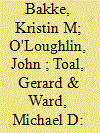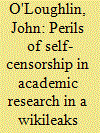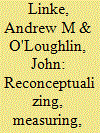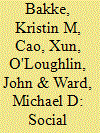|
|
|
Sort Order |
|
|
|
Items / Page
|
|
|
|
|
|
|
| Srl | Item |
| 1 |
ID:
134524


|
|
|
|
|
| Summary/Abstract |
De facto states, functional on the ground but unrecognized by most states, have long been black boxes for systematic empirical research. This study investigates de facto states’ internal legitimacy—people's confidence in the entity itself, the regime, and institutions. While internal legitimacy is important for any state, it is particularly important for de facto states, whose lack of external legitimacy has made internal legitimacy integral to their quest for recognition. We propose that the internal legitimacy of de facto states depends on how convincing they are to their “citizens” as state-builders. Using original data from a 2010 survey in Abkhazia, we examine this argument based on respondent perceptions of security, welfare, and democracy. Our findings suggest that internal legitimacy is shaped by the key Weberian state-building function of monopoly of the legitimate use of force, as well as these entities’ ability to fulfill other aspects of the social contract.
|
|
|
|
|
|
|
|
|
|
|
|
|
|
|
|
| 2 |
ID:
150489


|
|
|
|
|
| Summary/Abstract |
For the past six years, the availability of WikiLeaks data—including the SIGACTS violent event data for Afghanistan and Iraq as well as the diplomatic cables—has posed an important challenge for international relations and conflict researchers. Despite the evident attractions of the vast trove of primary data involving US military and diplomatic interests, only a few peer-reviewed academic papers have been published. The reluctance to analyze WikiLeaked information is mostly due to self-censorship. Because of its character, we cannot reliably know why American academics engage in self-censoring, but worries about repercussions for career prospects or fear of prosecution are probable. Despite threats of legal consequences by governmental officials, none have occurred (to my knowledge). Academics who have publicly spurned analysis of WikiLeaks information have made two arguments, either a) that it is against US law to access the data and/or that it helps America’s enemies or b) that the materials in the leaks are not worthy of much attention since they are not earth-shattering or unexpected. Neither of these claims holds much validity.
|
|
|
|
|
|
|
|
|
|
|
|
|
|
|
|
| 3 |
ID:
137791


|
|
|
|
|
| Summary/Abstract |
How does political violence affect the attitudes and beliefs of affected populations? This question remains of central concern to the discipline of conflict studies. In response, we make the case (by empirical example) that the choice of spatial and temporal ranges of analysis influences conclusions about the associations between exposure to political conflict and subsequent opinions. Using 2005 survey data from Russia's North Caucasus and georeferenced conflict data for the preceding 2 years, we find that violence affects levels of ethnic pride, trust in public institutions, and preferences for ethno-territorial separation, as well as other postwar attitudes. By designating a wide range of distance and time boundaries for capturing a conflict/attitude relationship, we argue for a more inductive style of analyzing theoretical propositions than is usually found in the field of conflict research. Our research is framed within the theoretical and empirical discussions of contextual-, neighborhood-, and community-level drivers of individual-level outcomes from the political geography and conflict studies literatures.
|
|
|
|
|
|
|
|
|
|
|
|
|
|
|
|
| 4 |
ID:
050097


|
|
|
| 5 |
ID:
086960


|
|
|
|
|
| Publication |
2009.
|
| Summary/Abstract |
This article examines attitudinal differences and similarities among ethnic groups in conflict-affected societies. Conventional wisdom tells us that societies that have experienced violent struggles in which individuals of different ethnic groups have (been) mobilized against each other are likely to become polarized along ethnic lines. Indeed, both policy-makers and scholars often assume that such divisions are some of the main challenges that must be overcome to restore peace after war. We comparatively examine this conventional wisdom by mapping dimensions of social distance among 4,000 survey respondents in Bosnia-Herzegovina and the North Caucasus region of Russia. The surveys were carried out in December 2005. Using multidimensional scaling methods, we do not find patterns of clear attitudinal cleavages among members of different ethnic groups in Bosnia-Herzegovina. Nor do we find patterns of clear ethnic division in the North Caucasus, although our social distance matrices reveal a difference between Russians and ethnic minority groups.
|
|
|
|
|
|
|
|
|
|
|
|
|
|
|
|
| 6 |
ID:
180482


|
|
|
|
|
| Summary/Abstract |
Respondents often answer ‘don’t know’ to sensitive survey questions to avoid revealing their true opinions, especially in post-conflict societies, thus requiring difficult decisions for analysing affected survey data. Using the same five sensitive questions in ten surveys from conflict-affected societies in the former Soviet Union in the period 2005–2014, methods for coping with missing data resulting from ‘don’t know’ responses are presented. Many commonly applied missing data treatments are shown to be incompatible with the missing data mechanism for politically sensitive questions, while also significantly affecting statistical results and conclusions. Ultimately, knowledge of local context is paramount for choosing proper missing data treatments.
|
|
|
|
|
|
|
|
|
|
|
|
|
|
|
|
|
|
|
|
|